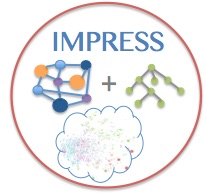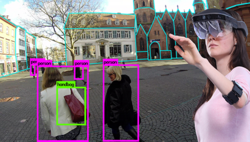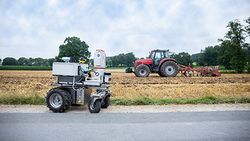
Overview of German-French cooperation at DFKI
On 22 January 2020, the first anniversary of the Aachen Treaty, the French National Institute for Information Technology, Inria, and DFKI signed a Memorandum of Understanding. The two scientific institutions agreed to strengthen their cooperation in the field of AI significantly, to structure and formalize their long-standing scientific collaboration.
Inria and DFKI will work together in a joint strategic research and innovation agenda in the areas of AI for Industry 4.0, AI infrastructures, AI and cybersecurity, human-robot collaboration, wearables, and other topics. A core part of the agreement consists of the strong shared commitment to the European AI initiative CLAIRE (Confederation of Labs for AI Research in Europe). CAIRNE aims to bring European AI researchers closer together and collectively advance European research for AI that benefits people while respecting fundamental European values.
Concrete measures include the implementation of joint research and innovation projects, which partly build on both organizations' existing projects. Furthermore, new topics will be defined and elaborated in joint workshops. The first projects have been launched in the pilot year 2020.
CLIMACTIC – Dynamic Planning in Individual Manufacturing along the Supply Chain
The fulfilment of individual customer requirements is becoming an increasingly decisive factor when considering the competitiveness of companies. The make-to-order or engineer-to-order production resulting from this not only have an impact on the manufacturing process, but also on the entire value chain of the product - starting with the raw material supplier and ending with the end customer. Compared to mass and serial production, this dynamic poses challenges for the supply chain - a continuous adaptation to requirements throughout the entire supply chain. This is no longer manageable with static optimization methods. Using real-time data and methods of Artificial Intelligence, an intelligent system is to be developed that enables a proactive and semi-automated adaptation and optimization of individual manufacturing processes, taking into account current and predicted external and internal business events and situations.
ENGAGE - NExt GeNeration ComputinG Environments for Artificial intelliGEnce
The fulfilment of individual customer requirements is becoming an increasingly decisive factor when considering the competitiveness of companies. The make-to-order or engineer-to-order production resulting from this not only have an impact on the manufacturing process, but also on the entire value chain of the product - starting with the raw material supplier and ending with the end customer. Compared to mass and serial production, this dynamic poses challenges for the supply chain - a continuous adaptation to requirements throughout the entire supply chain. This is no longer manageable with static optimization methods. Using real-time data and methods of Artificial Intelligence, an intelligent system is to be developed that enables a proactive and semi-automated adaptation and optimization of individual manufacturing processes, taking into account current and predicted external and internal business events and situations.
FAIRe – Frugal Artificial Intelligence in Resource-limited environments
Artificial intelligence (AI) is finding increasingly diverse applications in the physical world, especially in embedded, cyber-physical devices with limited resources and under demanding conditions. This type of AI is referred to as "Frugal AI" and is characterised by low memory requirements, reduced computing power and the use of less data. The FAIRe (Frugal Artificial Intelligence in Resource-limited environments) project of DFKI and the French computer science institute Inria is developing a comprehensive approach for all abstraction layers of AI applications at the edge.
https://www.dfki.de/en/web/news/resource-aware-edge-ai-enables-ai-applications-on-mobile-devices
IMPRESS – Improving Embeddings with Semantic Knowledge

Virtually all NLP systems nowadays use vector representations of words, a.k.a. word embeddings. Similarly, the processing of language combined with vision or other sensory modalities employs multimodal embeddings. While embeddings do embody some form of semantic relatedness, the exact nature of the latter remains unclear. This loss of precise semantic information can affect downstream tasks. The goals of IMPRESS are to investigate the integration of semantic and common sense knowledge into linguistic and multimodal embeddings and the impact on selected downstream tasks. IMPRESS will also develop open source software and lexical resources, focusing on video activity recognition as a practical testbed.
MePheSTO – Digital Phenotyping 4 Psychiatric Disorders from Social Interaction
MePheSTO is an interdisciplinary research project that aims to develop a scientifically grounded, artificial intelligence based methodology for identifying and classifying measurable, and thus objective, digital phenotypes of psychiatric disorders. The aim of the project is to develop a technological platform for the cientifically validation of phenotypes for psychiatric disorders based on multimodal inputs such as speech, video and biosignals from clinical social interactions. For this purpose, researchers collect data from video recordings, conversations, but also from brain or heart activity (EEG, ECG).
MOVEON – Visual Robust Spatial Scene Understanding in Dynamic Environments using Intermediate Representations

The aim of the MOVEON project is to develop a novel generation of visual positioning systems that goes beyond classical localization and mapping, which focuses currently only on point cloud reconstruction. In contrast, our aim is to allow for 6DoF positioning and global scene understanding in wild and dynamic environments (e.g. crowded streets) that scales up nicely with the size of the environment, and that can be used persistently over time by reusing consistent maps. MOVEON will push forward the state of the art in vision-based, spatio-temporal scene understanding by merging novel machine-learning approaches with geometrical reasoning. Deep-learning-based recognition and understanding of high-level concepts such as vanishing points or large object classes will serve as unitary building blocks for a spatio-temporal localization and environment reconstruction that will use geometric reasoning as underlying support.
NEARBY – Noise and Variability-free BCI Systems for Out-of-the-lab Use
Brain-Computer-Interfaces, or BCIs for short, offer a promising opportunity for interaction between the human brain and technology. NEARBY aims to develop a robust and variability-free BCI for use outside the laboratory. This technology can be used in industrial manufacturing and robotic assistance in care. Challenges such as limited decoding capability and fluctuating BCI performance affect the precise interpretation of brain signals. In addition, individual and time-consuming system calibration takes a lot of time, especially with the commonly used gel-based electrodes to improve signal quality. To better understand the variability of brain activity and develop algorithms that can deal with it, NEARBY combines basic research and industrial application. To this end, EEG data and metadata are collected over a longer period of time during the use of BCIs and DFKI's secure SEMLA architecture is used for processing and anonymization. The aim is to create a comprehensive open source database that covers the broadest possible spectrum of variability in brain data in order to be able to research this in detail. The long-term goal is to develop a reliable BCI with simple dry electrodes that can function throughout the day in a wide variety of application scenarios without recalibration.
R4Agri – Reasoning on Agricultural Data

Even if robots are to work autonomously over a longer period of time in the future, they must, of course, comply with the technical and legal rules that apply in the area of application. In the R4Agri project, the German Research Center for Artificial Intelligence (DFKI) and the French Institut national de recherche en informatique et en automatique (INRIA) are developing foundations for AI-based recommendation systems for decision support. Agricultural robotics is the exemplary application area for this basic research; findings from it will be incorporated into transfer projects on the digitalization of agricultural technology running in parallel at DFKI.
Contact
DFKI Operative Coordinator for German-French AI Cooperation
Tel.: +49 681 85775 5262
E-Mail: Anselm.Blocher@dfki.de
